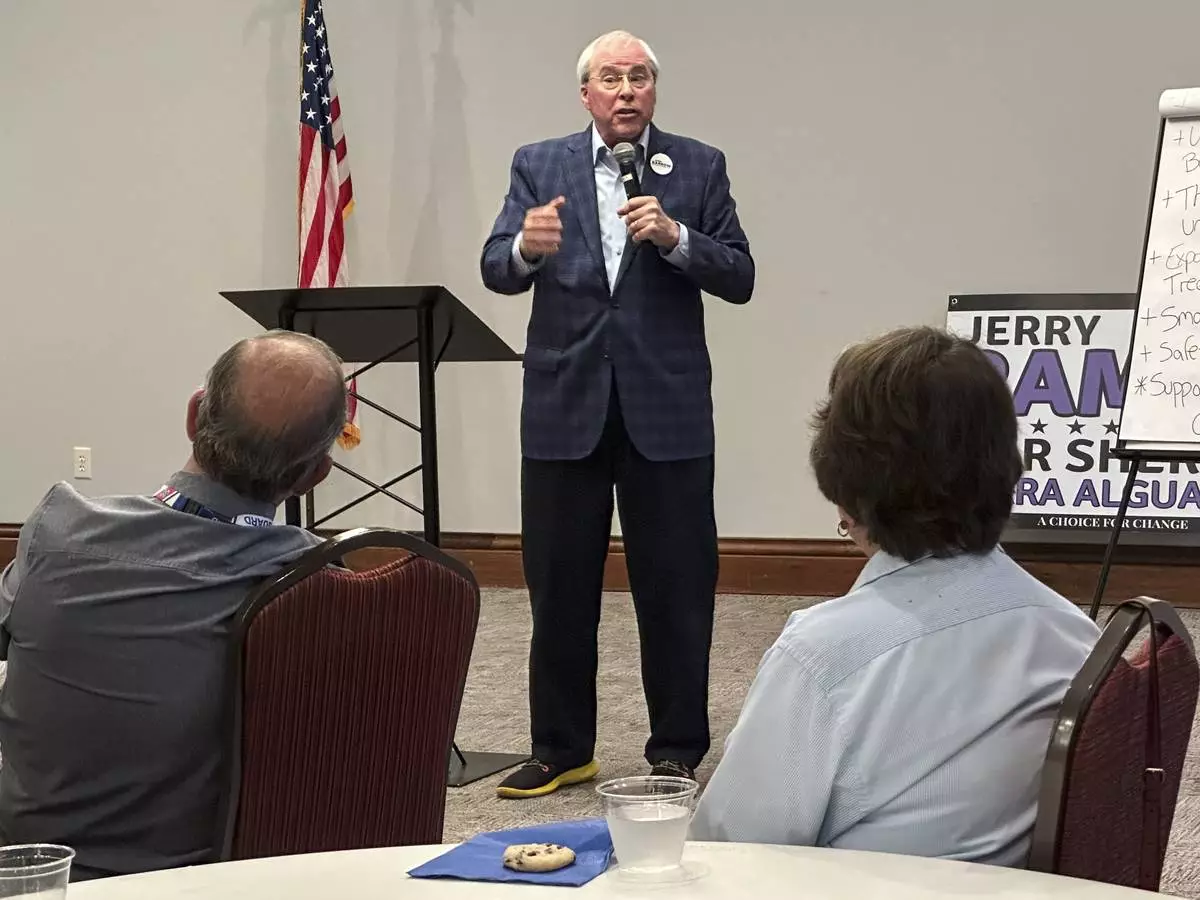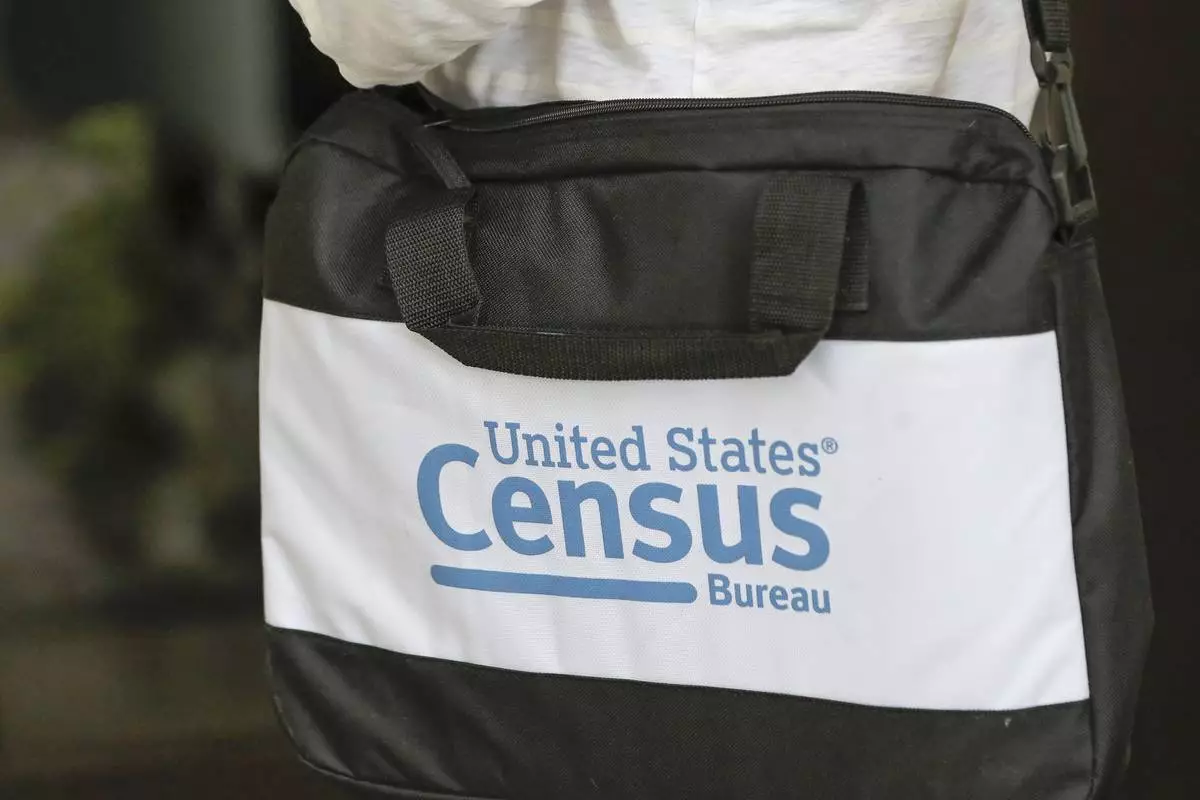HOSCHTON, Ga. (AP) — May's election for the Georgia Supreme Court is playing out as races for the state's highest court have for decades: sitting justices running uncontested.
But there is an exception, and it's driven by the issue that has roiled politics across the country for the past two years: abortion.
Justice Andrew Pinson is the only one of four incumbents seeking election to draw a challenge, and it's a formidable one. Former U.S. Rep. John Barrow, a Democrat, hopes to harness a voter backlash to abortion restrictions to unseat Pinson in what could be a model for future Georgia court contests in a state that has become a partisan battleground.
The May 21 general election for a six-year term is nonpartisan, and a Barrow victory wouldn't change the conservative leanings of the court. Eight of the nine justices, including Pinson, were appointed by Republican governors. The other won his seat unopposed after being appointed to a state appellate court by a Democratic governor.
Barrow's bid is seen as a longshot. Pinson, appointed two years ago by Republican Gov. Brian Kemp, appears to be raising more campaign money as the state's legal establishment closes ranks around him.
But Barrow hopes a voter backlash against Georgia's near-total abortion ban is the path to an upset.
In talks primarily to Democratic groups, Barrow says that when Pinson was Georgia’s solicitor general, he was the lawyer most responsible for the state supporting the Mississippi case that led to the U.S. Supreme Court overturning a constitutional right to abortion in 2022.
That decision cleared the way for a 2019 Georgia law to take effect banning most abortions after fetal cardiac activity can be detected, usually in about the sixth week of pregnancy. That’s before many women know they are pregnant.
At an April 15 Democratic meeting in a retirement community northeast of Atlanta, Barrow attacked Pinson’s former membership in the Federalist Society and his term as a clerk for Supreme Court Justice Clarence Thomas, drawing boos from the 50 attendees.
Barrow said he believes Georgians have a state constitutional right to abortion and that voters would boost their chances of restoring broader access to abortion by doing something they've never done before: defeating an incumbent state justice.
“I happen to believe that the Georgia Constitution does provide a right of privacy, and that encompasses everything that we associate with what was the law under Roe vs. Wade. And then it’s probably wider,” Barrow said. “That would mean the current statute, the current ban we’re living with right now, violates that provision of the Constitution.”
Opponents of the six-week ban are challenging it in state court, arguing Georgia’s unusually well-developed law protecting privacy should void it. That case is almost certainly headed back to the Georgia Supreme Court
Pinson said it would be inappropriate to discuss his views on abortion or other topics that might come before the court.
“If judges start talking about issues in cases that come before the court, or that could come before the court and opine, ‘Personally, I think this; personally I think that,’ man, it just starts chipping away at people’s confidence in our judiciary,” Pinson said in an interview.
State supreme court races have become more expensive in recent years as courts have weighed issues like political gerrymandering. The U.S. Supreme Court decision overturning the right to abortion has put those races under even greater scrutiny in the past two years as the divisive issue has returned to the states.
Public polling shows the majority of people in the U.S. support a right to abortion, and voters have affirmed abortion rights in seven states over the past two years since Roe v. Wade was overturned, including in Republican-leaning states such as Kentucky, Montana and Ohio.
Douglas Keith, who tracks state supreme courts for the Brennan Center for Justice at New York University, said money has poured into races from groups on the left and right, creating contests like the one last year in Wisconsin. There, a liberal judge backed by Democrats flipped the court after defeating a former justice supported by Republicans and anti-abortion groups in the most expensive state Supreme Court race ever.
“We are seeing money like we’ve never seen before in these races. Candidates and groups are adopting messages that they’ve never used in judicial elections before, and there’s just generally more attention on these races," Keith said.
Pinson, 37, graduated first in his law school class at the University of Georgia and served four years as solicitor general, helping Georgia win a long-running water rights dispute. Kemp named Pinson to the state Court of Appeals in 2021 and elevated him to Georgia's high court a year later. Many lawyers, including some Democrats, have endorsed him for election.
Meaningful electoral challenges to sitting Georgia judges are rare. Anthony Michael Kreis, a law professor at Georgia State University, said that reflects a “small club dynamic” prevailing within Georgia’s legal establishment.
“I just think that we’re dealing with a kind of old-school mentality, where people don’t really want to engage in the kind of partisan warfare over judicial seats like we’ve seen in some other states,” Kreis said.
Barrow, 69, served five terms in Congress and for a time was the only white Democratic representative from the Deep South. He finally lost in 2014 after Republicans gerrymandered his district a second time. In 2018, he narrowly lost a statewide race for Georgia secretary of state to Republican Brad Raffensperger.
Although justices are elected, the pattern has been for a justice to resign and let the governor appoint a successor. A newly appointed justice then gets two years on the bench before facing voters.
Barrow was denied a chance to run in 2020 after a justice announced he would resign after the election date before his term ended. A challenge arguing the election should be held anyway was rejected. Barrow calls the system of appointments “dysfunctional” and pledges that if elected he will let voters choose his replacement.
“If the voters give me the office, I’m going to give it back to the voters,” he said.
While his victory wouldn't change the overall political composition of the court, Barrow said it would send the state's justices a message on abortion rights. He referenced the decision earlier this year by the Alabama Supreme Court that declared frozen embryos created through in vitro fertilization could legally be considered children and an Arizona Supreme Court decision earlier this month reviving an abortion ban from 1864, before Arizona was a state.
“We’re getting an education right now all across the country as to how important the office of state supreme court justice is," Barrow said.

Supreme Court Justice Andrew Pinson poses for a photo, Wednesday, April 17, 2024, in Atlanta. Ga. Pinson, is running against John Barrow in a nonpartisan election for Supreme Court Justice, in May. (AP Photo/Mike Stewart)

John Barrow speaks to a Democratic group in Hoschton, Ga., on Monday, April 15, 2024, seeking support in his race for the Georgia Supreme Court. Barrow is basing his campaign for the high court around his support for abortion rights as he challenges incumbent Justice Andrew Pinson in a nonpartisan election in May. (AP Photo/Jeff Amy)

Supreme Court Justice Andrew Pinson poses for a photo, Wednesday, April 17, 2024, in Atlanta. Ga. Pinson, is running against John Barrow in a nonpartisan election for Supreme Court Justice, in May. (AP Photo/Mike Stewart)

John Barrow speaks to a Democratic group in Hoschton, Ga., on Monday, April 15, 2024, seeking support in his race for the Georgia Supreme Court. Barrow is basing his campaign for the high court around his support for abortion rights as he challenges incumbent Justice Andrew Pinson in a nonpartisan election in May. (AP Photo/Jeff Amy)










